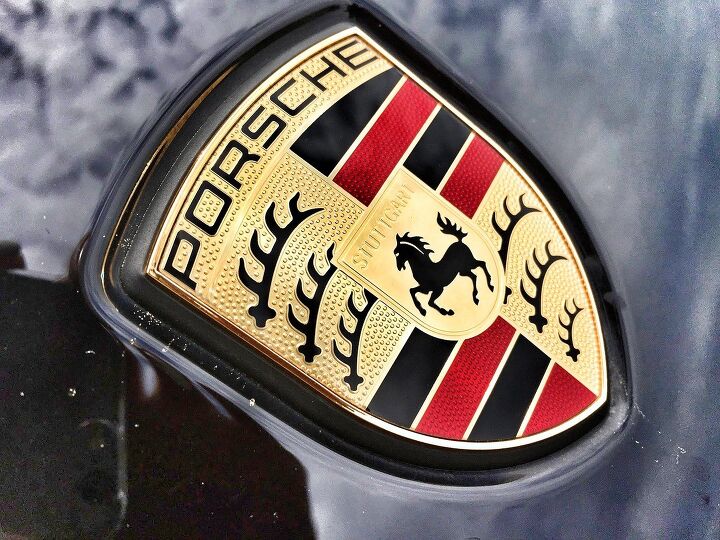Which Automakers Gave New Car Buyers Sweet Satisfaction? Hint: Not FCA

J.D. Power & Associates has released its sales satisfaction index, and there’s a familiar tri-shield insignia gracing the top honors. There were also a slew of stinkers we are gradually growing accustomed to seeing on the bottom any list denoting some form of quality.
Buick topped the mass-market section of J.D. Power’s most recent sales satisfaction stud y with 809 out of a possible 1,000 points. General Motors’ not-so-luxurious luxury brand was trailed by Mini, Chevrolet, and GMC. Subaru and Volkswagen tied for fifth place with 775 points apiece. Mini had been J.D. Powers’ previous industry leader for sales satisfaction from 2010 onwards.
In the actual luxury segment, Porsche was out in front with 824 points. Infiniti came in second with 815, followed by Mercedes-Benz. BMW and Cadillac were tied with 807 and just ahead of Lincoln’s 806 points.
While Porsche’s win may not come as too big of a surprise, Buick’s performance was a little less expected. However, the company’s recent accolades at Consumer Reports and immense popularity overseas don’t make this seem like a staggering impossibility either.
Similarly to Consumer Reports’ Reliability Rankings, Buick’s impressive showing was mirrored by Fiat Chrysler brands rounding out the bottom of the list. Jeep, Dodge, and Ram were the three lowest-ranked brands on the satisfaction index. For luxury brands, Acura was the worst performer. However, it is worth mentioning that even the lowest scoring Ram still received a score of 733, which isn’t terribly far from the mass-market average of 764.
The U.S. Sales Satisfaction Index Study measures overall satisfaction of the sales experience for new vehicle buyers and rejecters. J.D. Power says its metric of “buyer satisfaction” is based upon working out the deal, experience with the salesperson, delivery process, and quality of the facility. “Rejecter satisfaction” is based on the experience had with the salesperson, perceived fairness of price, experience negotiating, inventory, and the quality of the facility. Overall, buyer satisfaction is more heavily weighted than rejecter satisfaction.
Some interesting takeaways from the study included an indication that older customers were easier to please than their younger counterparts, and that the telephone has remained a viable shopping tool. While most buyers used the internet at some point during their purchase, almost half also used the telephone, and those that did retained a higher satisfaction rate overall.
J.D. Power also found consumers gave higher satisfaction scores when engaging with sales people or product specialists that helped them understand vehicle technologies. Owners who worked with both a salesperson and product specialist tended to be more satisfied with the overall experience than those who dealt only with a salesperson.
[Image: General Motors]

A staunch consumer advocate tracking industry trends and regulation. Before joining TTAC, Matt spent a decade working for marketing and research firms based in NYC. Clients included several of the world’s largest automakers, global tire brands, and aftermarket part suppliers. Dissatisfied with the corporate world and resentful of having to wear suits everyday, he pivoted to writing about cars. Since then, that man has become an ardent supporter of the right-to-repair movement, been interviewed on the auto industry by national radio broadcasts, driven more rental cars than anyone ever should, participated in amateur rallying events, and received the requisite minimum training as sanctioned by the SCCA. Handy with a wrench, Matt grew up surrounded by Detroit auto workers and managed to get a pizza delivery job before he was legally eligible. He later found himself driving box trucks through Manhattan, guaranteeing future sympathy for actual truckers. He continues to conduct research pertaining to the automotive sector as an independent contractor and has since moved back to his native Michigan, closer to where the cars are born. A contrarian, Matt claims to prefer understeer — stating that front and all-wheel drive vehicles cater best to his driving style.
More by Matt Posky
Latest Car Reviews
Read moreLatest Product Reviews
Read moreRecent Comments
- Namesakeone Yes, for two reasons: The idea of a robot making decisions based on algorithms does not seem to be in anyone's best interest, and the thought of trucking companies salivating over using a computer to replace the salary of a human driver means a lot more people in the unemployment lines.
- Bd2 Powertrain reliability of Boxer engines is always questionable. I'll never understand why Subaru held onto them for so long. Smartstream is a solid engine platform as is the Veracruz 3.8L V6.
- SPPPP I suppose I am afraid of autonomous cars in a certain sense. I prefer to drive myself when I go places. If I ride as a passenger in another driver's car, I can see if that person looks alert and fit for purpose. If that person seems likely to crash, I can intervene, and attempt to bring them back to attention. If there is no human driver, there will probably be no warning signs of an impending crash.But this is less significant than the over-arching fear of humans using autonomous driving as a tool to disempower and devalue other humans. As each generation "can't be trusted" with more and more things, we seem to be turning more passive and infantile. I fear that it will weaken our society and make it more prone to exploitation from within, and/or conquest from the outside.
- JMII Based on the human drivers I encounter everyday I'll happily take my chances with a computer at the wheel.The highway driver assist system on my Santa Cruz is great, it can self drive perfectly in about 90% of situations. However that other 10% requires you to be in control and make decisions. I feel this is the problem with an AI driving a car, there are times when due to road construction, weather conditions or other drivers when only a human will know what to do.
- Hari Your route home sounds like the perfect stretch for a car like the Alfa Romeo Giulia. Its renowned handling and dynamic performance make it an ideal match for those curves. For enthusiasts or potential owners interested in understanding all the capabilities of the Giulia 2017, the owner’s manual is an invaluable resource. Check it out here: https://chatwithmanuals.com/automobiles/2017-alfa-romeo-giulia-owners-manual/. Our AI-powered chat makes navigating the manual simple, helping you quickly find specific details about the car's features and specs. Perfect for making the most out of those driving moments and truly understanding your vehicle!



































Comments
Join the conversation
The best experience is usually with a small town dealer that has to keep a good reputation to stay in business. I bought a car from a Honda dealer in Orlando and the experience was awful. I took a test drive in the car I went to look at, told the salesman up front I was paying cash and he still pulled the 4 square on me. After what seemed like his 20 trips to the "sales manager's" office we finally struck a deal. The F&I guy put me through the ringer and they delivered the car without washing it. It was about a 3 1/2 hour ordeal. I've dealt with three dealers in my little home town of about 40,000 people, if you count the farmers up the road. All three dealers were great. The FAC dealer for parts, the Ford dealer for a Ranger, and most recent purchase was a Civic coupe. The local Honda dealer was the total opposite of the Orlando store. I stopped by and looked at the car one day because it caught my eye, told the salesman I wasn't ready to buy today and there was zero pressure to find out "what it would take for me to drive home in it today." I went back a few days later and was out of there with the car in an hour & 10 minutes with a smile on my face. The F&I guy offered a warranty, I said, "No thanks", he said "I had to ask" and never offered me another add-on, just a pile of papers to sign. The service department has been great too, except their magazines suck. Even if I move to the city, I'll be buying my cars from a small town dealer.
Yep, the dealer experience vs. the vehicle experience can be totally disconnected. I have no reason to deal with an FCA dealer so I can't comment on that. I can comment that in 2003 which I bought a MINI Cooper S, the dealer experience was quite satisfactory, almost fun even, although the car turned out be somewhat on the unreliable side (but fun to drive, I must say). A 2007 visit to a Subaru dealership was painful (they started out by selling me a car that was already sold) but I'm loving the 05 Legacy GT wagon to this day (but it's being serviced elsewhere!)